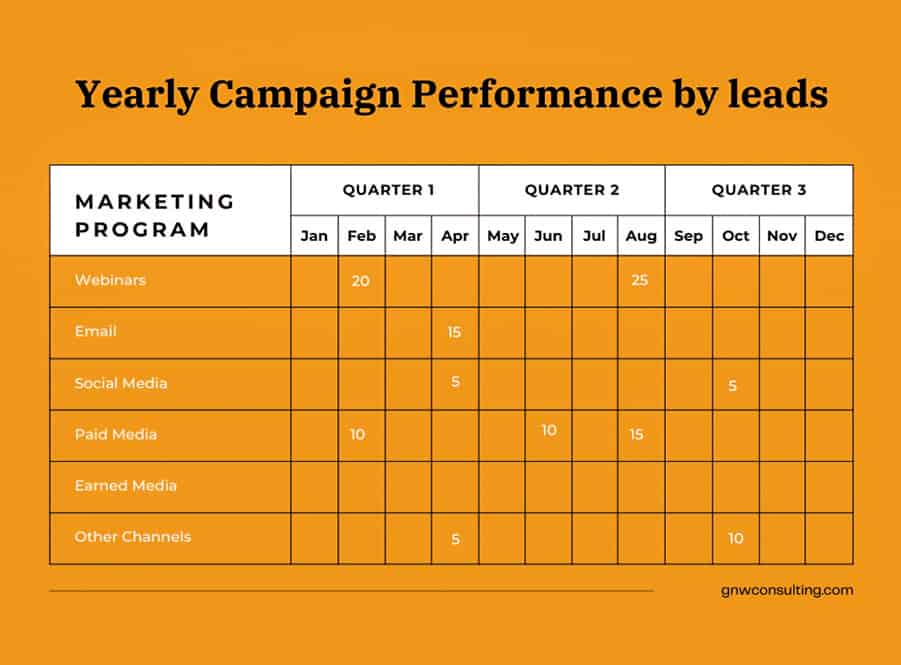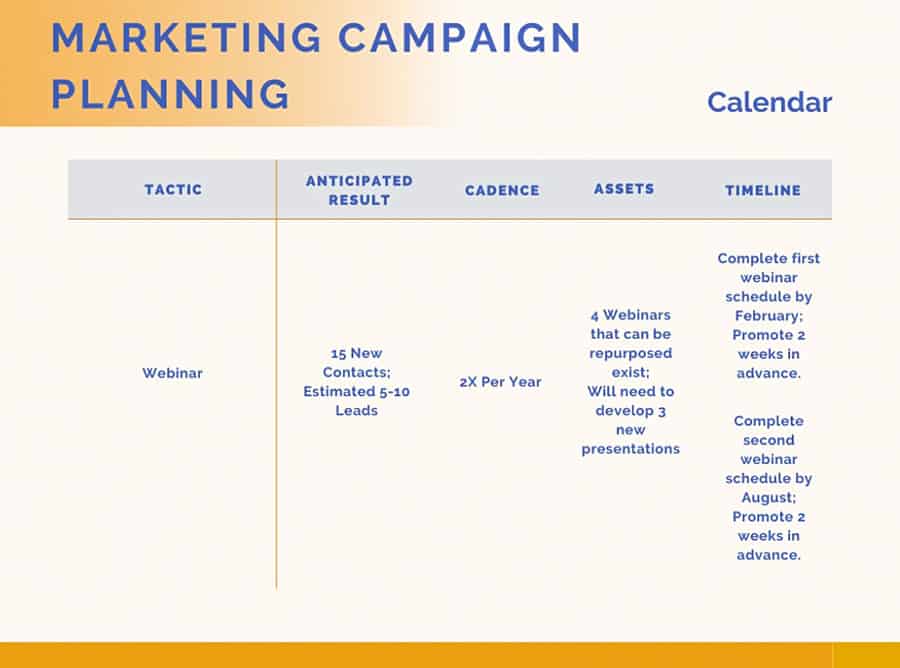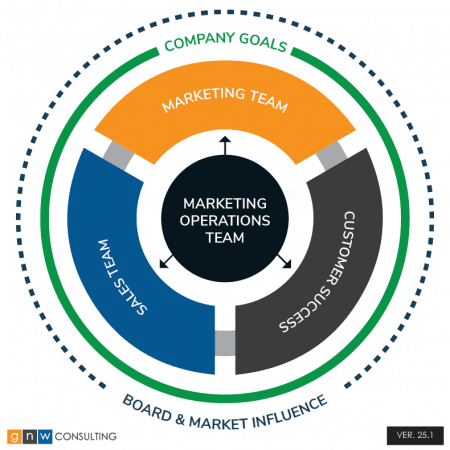It’s the most strategic time of the year! If you’re like most marketers, strategic planning probably makes you think of dull PowerPoint presentations with zero creativity. However, there are so many ways to make planning your 2025 budget smarter and more creative.
These tips will not only help you stay on track throughout the year but provide guidance to ensure you’re always taking the smartest step forward while introducing some new marketing processes.
2025 Strategic Planning Guide:
- A Smarter Planning Process
1.1 Meet Across Departments
1.2 Zero in On the Business Goals
1.3 Focus on Strategy, Not Tactics
1.4 Create a Calendar - Taking the Right Steps
- Remember Resilience Matters
- Leveraging The GNW RevOps Framework
Despite popular belief, you can inject a bit more creativity into your marketing strategy outlines while still driving home the objectives needed to drive results. While it can be easy to jump straight into the planning process with your marketing counterparts, we recommend following these steps before starting a single document.

Meet Across Departments
While your marketing ecosystem should be proactive in driving the strategic planning process, we think it’s important to build the framework around what other departments want to achieve. Supporting larger business objectives isn’t just about ensuring the right marketing approach, it’s about careful orchestration of all departments and developing a plan and process that works for everyone, not just marketing.
During your meetings with other departments, we recommend keeping the following questions top of mind to ensure you’re creating a process for everyone:
- What are the executive priorities for the year? Are they quantifiable or broad?
- What pipeline and revenue numbers is the company aiming for within the fiscal year?
- Any adoption rates, churn, or new product launches that should be considered within your plan for the following year?
Zero in On the Business Goals
Don’t build a plan without the right foundation. Marketing operations and sales should be aligned on what the business goals are and the overall revenue strategy. If the goal is to generate $10M in new business, you’ll have to ensure that your marketing plans align with sales’ ability to close deals.
The last thing you want to do is overwhelm them with leads that cannot be processed or focus on a plan that only delivers a specific number of deals without focusing on lead quality.
“ Working on planning within a silo is the most common habit we see across marketing teams. It can be hard to really zero in on business goals without clear visibility into other departments throughout the year.”
- Raja, GNW Consulting
Focus on Strategy, Not Tactics
Focus on how your existing tactics are working – treat this as strategically as possible by identifying strengths, weaknesses, opportunities, and possible threats. If your existing programs need updates or adjustments, incorporate this into your overall planning, and then determine how these changes will affect your marketing operations and strategy.
Determine where your new leads came from and come up with a plan to scale those efforts, don’t forget to provide estimates of how that can play out, for example:

Create a Calendar
Once you’ve determined campaign performance by leads, you’ll be able to establish focused goals that strategically align to business objectives. At this point, and only at this point, will you be able to create a calendar of activities from content marketing to events. Be sure to share this across departments, so everyone knows that they can expect to see throughout the year.
When creating this asset or slide, we recommend using this template. We’ve laid out an example of what you need to determine for every tactic:

We recommend running this by all departments to ensure anticipated results are communicated ahead of time. Cadences and timelines should also be approved before moving forward with the overall plan. Having the ability to lay out this information can help ensure there’s a strong tie between marketing dollars and activities. It’ll also make it that much easier to ask for the correct budget while setting the expectation for anticipated results with executive leadership.
Taking the Right Steps
Strategic planning can be broken down into simple steps to ensure it continues to be a critical tool to help marketers thrive in a continuously hybrid world. The biggest trend we see with consulting clients is that they create a list of tactics they want to achieve instead of a strategic marketing plan. Marketing operations should be thought of as you create a strategic overview.
Take the following steps into account when evaluating tactics to ensure that your list turns into a plan:
- Align to a corporate objective to ensure that every specific tactic responds to a certain business target. This will also allow you to make a scalable and repeatable plan that can be adjusted to ensure return on investment.
- Set SMART marketing goals with measurable results. Understanding business goals will help create context for your tactics, but SMART goals can help ensure you’re achieving the results you’re after. SMART goals are – Specific, Measurable, Attainable, Relevant and Timely.
- Decide your investment allocation. You’ll need to allot a specific amount of budget for each tactic, the tactics that have brought more success in the past should receive a bulk of the budget, while tactics that continue to lag (if they’re not a new priority) should receive less.
- Define key stakeholders for each project. If you’re looking to take campaign mapping a step further, we recommend determining responsible stakeholders for each project and measuring the level of effort and team members needed to accomplish each project.
- Keep your plans fresh. Don’t just put the effort into planning before the year starts, set up check-ins throughout the year to ensure your plan from January is still relevant in June and August. Knowing where you are along the way can help you execute and adjust as needed.
“Structure follows strategy. Often teams get overwhelmed with what they want to do, but they don’t stop to think about why they want to do it and whether or not it is worth the investment that year. These steps can help you organize your resources.”
- Raja
Resilience Matters
We think it’s important to always keep resilience in mind as you work through your strategic plan. Putting this strategy together is only the first step, a plan is only as scalable as it is resilient. Obstacles will come up, revenue strategies change and a great strategic plan leaves enough room for pivoting – as we all know, making changes is always in play. Marketing operations must remain agile.

Your marketing team’s ability to manage unplanned events and adjust to the needs of other teams is a critical tool and necessity for all businesses. Instead of seeing this as a “goal”, it should be built into your team as a capability. Ensure that the risks and dependencies of your plan are calculated from the start and monitored along the way.
A ‘set it and forget it’ mindset is catastrophic for your strategic marketing plan, so creating one single plan that simply requires you to plug in components and adapt as needed is essential. Be sure to communicate this desire across teams and ensure that all “must-have” campaigns take priority over the “nice to have” desires.
One piece of advice you should takeaway? Build a solid foundation, plan often, and always adapt your strategy.
Leveraging The GNW RevOps Framework
With marketing budgets are taking a hard hit, companies may face long-term consequences such as loss of market share, weakened brand image, and lower customer engagement. It’s essential for businesses to carefully evaluate the potential repercussions of these budget cuts on their overall performance and strategic objectives.
A comprehensive framework can assist in this evaluation by highlighting the macro and micro factors that drive a company’s success.
The GNW Consulting Revenue Operations (RevOps) Framework serves as a comprehensive tool for understanding how Marketing Operations impacts an organization and the benefits it provides.
This framework has helped our clients justify their marketing budgets by demonstrating the impact marketing has on achieving company goals.
Click below to download your copy of the RevOps Framework.
